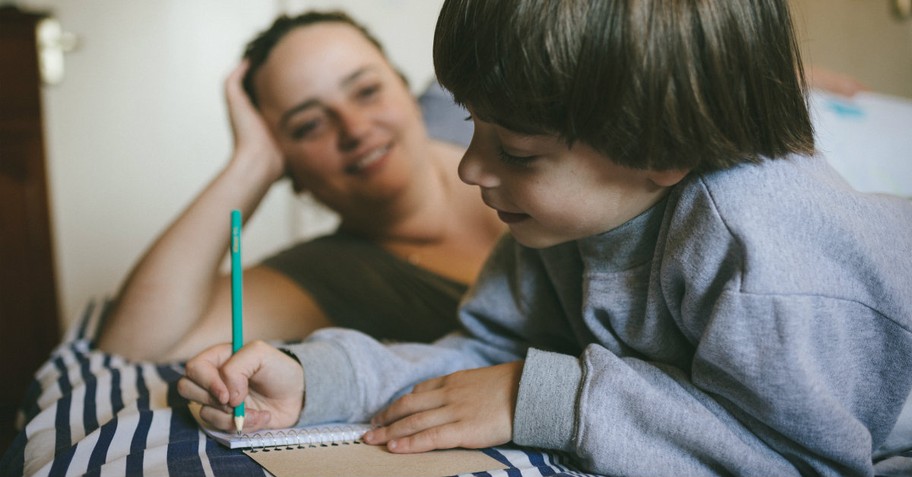5 Ways to Become a Courageous Parent

The majority of my greatest and most enduring anxieties have come with parenting, and speaking with other moms, I know I’m not alone. Our hearts are inextricably tied to our kids, as they should be. God has tasked us with the responsibility of keeping them safe in a world that, frankly, is filled with numerous dangers. Many more dangers, in fact, than when my daughter was young. But while we have plenty of cause for inner angst, we never want to parent from a place of fear. That will only steal our peace and challenge our reliance on Christ. Worse, we risk raising fear-driven children who grow up feeling as if they’re helpless victims in a harsh world that ultimately functions outside of God’s control.
Here are 5 ways we can become courageous parents.
Photo Credit: © Getty Images/Liderina

1. Honestly acknowledge the problem.
Our culture often seems to lean toward one of two extremes. Either we hide or deny our mental health challenges, pretending we’re as happy and relaxed as a woman on an all-expense-paid spa vacation. Or, we proudly announce our depression and anxiety as if doing so will gain us entrance into the “in crowd.” Both attitudes hinder our freedom. We can’t address what we won’t acknowledge, and we won’t want to change if we wear our illness like a badge of honor or permanent appendage, as was the case for me for some time.
I’ve struggled with anxiety for most if not all of my adult life, and for years, I assumed this was just who I was. That I was simply an anxious person and there wasn’t much I could do about it. But then one day a thought, which I believe came from God hit: This is not how God wants me to live. Jesus came to set me free, which means He’ll give me everything I need to experience that freedom.
That realization shifted my thinking from what had become something of a victim’s mentality to that of a victor. I began fighting my anxious thoughts strategically, prayerfully, and persistently, and as I did, my life began to change. I still struggle, and I may until my last breath on earth, but I’ve come a long way. Perhaps most importantly, I’m still moving forward.
2. Evaluate the cost of your anxiety.
When I’m worried about something, I can become so fixated on the possible effects of that what-if scenario that I ignore the damage caused by my fears themselves: My increased irritability, the stomach aches, lost sleep and time, my decreased productivity and effectiveness. My decreased ability to engage relationally, and the negative declarations I inadvertently yet routinely conveyed to my daughter.
When we allow our fears to drive our behavior, we’re in essence saying, “Yes, God is all-powerful and with you always, except in this situation. This problem we’re dealing with now, or that you might encounter later; it’s just too big. He can’t help us with this scenario.”
I determined those messages were more harmful, in the long term, than anything my daughter might face today. I knew she needed a strong and thriving faith in order to withstand all of life’s challenges. I wanted to enhance, rather than hinder, her trust in Christ. That didn’t mean I miraculously became a courageous parent. But I did become more determined in my growth process.
Photo Credit: © Getty Images/digitalskillet

3. Pray truth.
Numerous articles will stress the importance of “taking our thoughts captive” (2 Corinthians 10:5) and focusing on truth (Philippians 4:8-9). This is important for numerous reasons. First, Scripture itself, which is the very Word of God, holds supernatural power, able to break strongholds and nourish and bolster our souls. Second, we remind ourselves of who God is in all His fullness, all He’s done, and all He’s promised yet to do. This places our fears in proper perspective—in Almighty God, El Shaddai’s hands.
Praying Scripture increases its impact by uniting our spirit with Christ’s on an even deeper level. Plus, at least for me, turning my thoughts into something of a conversation helps me capture and shift them.
4. Pray against your fear.
Scripture tells us that our prayers are powerful, effective, and able to cast mountains into the sea. Through prayer and praise, a severely overpowered and terrified army found victory against ruthless attackers (2 Chronicles 20). God used the prophet Elijah’s prayers to lick up a trench filled with water and send rain upon a drought-devasted land (1 Kings 18-19). And the New Testament is filled with examples of God’s people, through prayer, casting out demons, healing the lame, and setting prisoners free.
God will still use our prayers to set captives free, including when those captives include you and me. Something beautiful happens as we connect to God through prayer. As Tim Keller puts it, “Prayer tunes [our] heart[s] to God” and God’s heart is always focused on our freedom. And “This is the confidence we have in approaching God: that if we ask anything according to His will, He hears us” (1 John 5:14, NIV). That doesn’t guarantee God will immediately and miraculously conquer our anxiety and fear. He might, but often His transforms us more gradually, addressing our whole selves.
For example, as we read Scripture each day, He’ll help us replace the lies that bind us with life-giving truth. He’ll lead us to supportive faith communities, in whom we can find increased strength and help in times of need. He might also give us the courage, when necessary, to seek out Christ-centered mental health experts and medication.
Photo Credit: © Getty Images/doidam10

5. Regularly reflect on God’s care.
In my daughter’s sophomore year of college, we discovered she had two learning disabilities that significantly hindered her academics. Unfortunately, her diagnosis came during her most stressful period to date, when she was already struggling to stay on top of her assignments and life. She needed certain accommodations to pass, and had to fight persistently for her university to honor student disability laws.
She worked so hard, often studying until one or two am, then getting up for an early morning test. Her consistent sleep deprivation began to blur her vision and, coupled with her mental fatigue, made her learning disabilities more pronounced. She’d dreamt of being an engineer since middle school and had diligently pursued her goals, but feared her efforts might not be enough. She’d call me in tears, “What if I can’t do this?”
Those heart-wrenching conversations became all the more challenging with every passing semester. If she failed, she’d have to start over with two years and tens of thousands of dollars lost. I spent countless hours in prayer, not knowing how to respond. Her decision to proceed or quit had to be just that—her decision. Her pain, all that was at stake, and the uncertainty of everything, knotted my insides. But then I reflected on the many ways God had cared for my daughter, since birth. I reminded myself of specific times, listing each in turn, when He’d guided, protected, or provided for her.
I also reflected on the truth preserved in Scripture, such as in Psalm 139, which tells me that God hand-crafted my daughter, knows everything about her, including every challenge she’ll ever face. Verse 16 says, “[His] eyes saw [her] unformed body; all the days ordained for [her] were written in [His] book before one of them came to be” (NIV).
Ephesians 2:10 reiterates this promise when it states, “For [she is] God’s masterpiece. He has created [her] anew in Christ Jesus, so [she] can do the good things he planned for [her] long ago” (NLT). These truths reminded me that God has a plan for her, one He set into motion before she took her first breath, struggled with her first test, or received her first diagnosis. I chose to trust that He would lead her toward that good and hope-filled plan, as He had been doing for every moment of her life prior.
Parenting is perhaps the most challenging, joy-filled, and at times, frightening role we will ever embrace. God created us as emotional beings, which means we will, on occasion, experience fear. Our challenge is to acknowledge and address our fear in a Christ-honoring way so that we can parent courageously, actively demonstrating what it means to live dependent on God.
Photo Credit: © Getty/Igor_Alexander
Originally published May 16, 2022.








